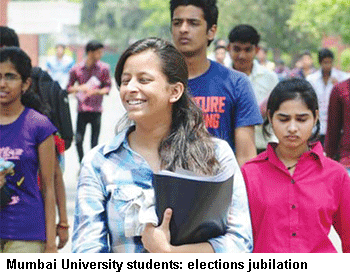 Student council elections in college and university campuses of Maharashtra (pop.114 million), will be held after a gap of 23 years in the forthcoming academic year 2018-19. While student leaders are jubilant about elections being permitted after an interregnum of two decades-plus — not a few leaders of national parties including Congress, BJP, CPM among others learnt the ropes of competitive politics on university campuses — most college principals fear that student council elections, made mandatory by the Maharashtra Public Universities Act, 2016, passed by the legislative assembly in December 2016 and applicable to the state’s ten public universities, will lead to a resurgence of acrimonious student politics prevalent in most states across the country.
Student council elections in college and university campuses of Maharashtra (pop.114 million), will be held after a gap of 23 years in the forthcoming academic year 2018-19. While student leaders are jubilant about elections being permitted after an interregnum of two decades-plus — not a few leaders of national parties including Congress, BJP, CPM among others learnt the ropes of competitive politics on university campuses — most college principals fear that student council elections, made mandatory by the Maharashtra Public Universities Act, 2016, passed by the legislative assembly in December 2016 and applicable to the state’s ten public universities, will lead to a resurgence of acrimonious student politics prevalent in most states across the country.
Following the on-campus murder of student leader Owen D’Souza in 1989, the Maharashtra Universities Act, 1994, banned competitive student elections, replacing them with a system of nomination of student representatives by college/university teachers, principals, directors of institutes and heads of departments. After a hiatus of 22 years, the BJP-Shiv Sena government enacted a new Maharashtra Public Universities Act, 2016, which concedes a long-standing demand of student unions affiliated with political parties across the ideological spectrum.
The 1994 ban on student union elections ensured that colleges and varsities in Maharashtra escaped the campus violence and disruption of academic studies that became endemic in the late 1990s and early noughties. In 2005, following a Supreme Court order, the Union ministry of human resource development constituted a committee under former election commissioner J.M. Lyngdoh to make recommendations on student elections. The Lyngdoh Committee recommended disassociation of student candidates from political parties, faculty-assisted elections, use of handmade posters etc. But despite a 2006 Supreme Court directive to all colleges and universities to implement the Lyngdoh Committee’s recommendations, political parties continued to clandestinely support their members to college councils, while expenditure restrictions imposed by the committee were openly flouted.
The Maharashtra Public Universities Act, 2016, which merely restores the status quo ante and makes on-campus student politics above board and transparent, is a clear admission that the recommendations of the Lyngdoh Committee were practised more in the breach than observance for almost two decades. However, despite the Act coming into force in March 2017, college principals are still reluctant to permit student elections, and particularly re-entry of political parties on their campuses.
“The majority of academics in Maharashtra favour the current system of nominated student representatives because increased political interference will dilute the quality of higher education. Currently, none of our 800 universities are ranked among the Top 200 in the World University Rankings published annually by the London-based rating agencies Quacquarelli Symonds (QS) and Times Higher Education. Therefore our institutional focus should be on upgrading and contemporising teaching-learning and improving research capability rather than grooming politicians. Our universities are for education and not for learning the dirty practices of Indian politics,” says the principal of a highly reputed Mumbai-based college, speaking on condition of anonymity.
College principals and vice chancellors are also vehemently opposed to full-fledged student union politics because the statutes committee for student elections constituted under the new Act, has proposed that college principals will be responsible for conducting safe elections on their campuses. “This is not an unreasonable expectation because under the Act, contesting students cannot use political party symbols, names of politicians or political influence while campaigning. Moreover, they have only one day to canvas and that too on designated forums as directed by principals. Political posters also have to be displayed on designated locations within campuses. If principals ensure adherence to the strict code of conduct suggested by us, they won’t have any reason to worry about campus violence. If we can conduct national elections for the Lok Sabha and state legislative assemblies peacefully, why should college and university elections pose such a huge problem?” queries R.S. Mali, chairman of the statutes committee.
Good question. It’s not too much to ask college heads and vice chancellors to enable students to practice full-fledged democracy instead of a limited version to prepare them for life beyond campus gates.
Dipta Joshi (Mumbai)